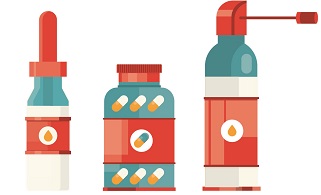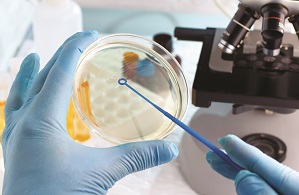Feature / Ideas factory
It is well known that some trusts earn additional income outside the day-to-day activity of treating NHS patients. Many will be familiar with private patient services or providing payroll or sterile services to other NHS organisations, for example. But how surprising would it be to learn that a trust has developed its own range of skincare products that’s on sale online and on the high street, with the profits funnelled back into the NHS?
Salisbury NHS Foundation Trust has such a range – MyTrusty – as a result of work by clinicians to help patients with dry or damaged skin. The first cream, based on sunflower oil, was made in the hospital pharmacy in 1987. But demand grew, not just from patients, but also staff and the public, and in 2012 the trust decided to commercialise the product. 
Malcolm Cassells (pictured), who retired as the trust’s finance director last month, has been a key figure in commercialising the product.
He says the driver for putting the range on
wider sale came from staff, patients and customers. ‘They think it’s wonderful, and the nice thing about it is that we’ve managed to get it out to far more people, who are now benefiting from it.’
The range is stocked in larger branches of Tesco, Superdrug and 500 Lloyds Pharmacy stores. There are six products in the range, though further products are in the pipeline.
Mr Cassells says: ‘There’s been a lot of learning. You need to get the expertise in to help – for example, in terms of marketing. We’ve had publicity over the years – the product’s been on TV and in the national papers – but we’ve never managed to use that to enable the sales to really take off.
‘We’ve had enormous numbers of sales on the website – thousands of customers – but because we didn’t understand the market it is only since we started to put it in large retailers that we are starting to see good growth. This will be worth a lot more going forward and international sales will increase the potential.’
The MyTrusty range is still
overseen by the trust, though there are plans to move it into a spin-off company. ‘When we do that, it could well be worth a lot more in due course. That’s very exciting and has huge potential for this trust in the future,’ Mr Cassells says.
Many trusts have income generation schemes. These could involve charging for certain services, such as private rooms, or commercial ventures, including pharmacy
or estates services.
Trusts have set up commercial departments or separate companies and entered into joint ventures to sell products ranging from management consultancy and software to education. Some offer their buildings as real-life settings for films and TV shows.
But, as the NHS commercialises its innovations, there are questions. Should tight NHS funds be used to support a non-core activity that may never reap a dividend, or if it does it could be years? And what of the NHS name? Is it acceptable to use this trusted and recognised brand, perhaps putting NHS funding and reputation at risk?
Managing the risks
Mark Stocks, a partner with Grant Thornton, which recently published a report on NHS companies, says the risks are manageable. ‘I don’t think the financial risk is that significant because they can be limited by guarantee or through a limited liability partnership.
‘There are risks, particularly where a trust invests heavily in something that fails, but why take that level of risk? If something is too big, it’s better to take a commercial partner to limit it. The risks are manageable, but you need the right people in place to manage the risks.’
The Department of Health set up seven – now six – regional innovation hubs in the 2000s to capitalise on NHS innovation and support NHS bodies in what for many will be unfamiliar territory. The North West hub, known as Trustech, provides legal and commercial support to local NHS organisations and helps find development funding. Hosted by Central Manchester Hospitals, Trustech has a collaboration agreement with the University of Manchester.
Its efforts to bring forward ideas have led to Dragons’ Den-style events – one, organised with Salford Clinical Commissioning Group, examined digital innovations from within and outside the NHS. As a result, two ideas from Salford Royal NHS Foundation Trust – a pharmacy communication platform and an electronic solution to help those at risk of falls live in their own home – are being piloted.
Trustech’s business development and partnerships director Raj Purewal feels the NHS may still not be exploiting the potential of its ideas but that there are barriers to commercial development. Medical technology can take time to develop – 12 years from bench to bedside in some cases, Mr Purewal says.
He adds that NHS organisations may find it difficult to justify diverting money away from frontline care. ‘The NHS tries to harness its innovations, but it has competing demands,’ he says. ‘Inventions can raise funds, but the remit of the NHS is to treat patients. Its job is not to raise funds, but to deliver care and provide treatment.’
The good news is that external funding is available – business grants, university research and development funding and private equity – but specialist help is needed to access these funding streams. And Mr Purewal says these interests will often seek a return for their investment, reducing the amount that can go back into the NHS.
The tariff can be a barrier – providing a disincentive to the adoption of innovations that move care out of hospital, for example.
Despite such barriers, he still believes the commercial development of NHS innovations is worthwhile. Indeed, Trustech has helped local NHS organisations develop a wide variety of products, from a device that treats difficulty with swallowing (dysphagia) to training packages for giving emotional support to cancer patients and a rehabilitation device that helps patients with lower limb injuries.
A partnership between Trustech, University Hospital of South Manchester NHS Foundation Trust and the University of Manchester developed a new device for fixing ruptured anterior cruciate ligaments (ACLs). The ACL stabilises the knee joint when changing direction. However, ACL reconstruction can fail in up to 80% of cases because fixation fails in the immediate post-operative period.
An alternative was developed by an orthopaedic surgeon at the trust, together with mechanical engineers from the university. Mr Purewal says the device, known as GraftBolt, reduces the failure rate to 20%. Trustech and university funding was used to develop the device and it has been on the market since 2010, sold under a licence agreement negotiated by Trustech.
First NHS company
Salisbury NHS Foundation Trust has a wide range of commercial activity. As well as MyTrusty, the trust set up Odstock Medical – the first NHS company – in 2005, which now trades nationally and internationally. It supplies electrical stimulation devices, which can help in the rehabilitation of people with loss of limb movement through stroke, multiple sclerosis or cerebral palsy, for example.
It also set up the South West Innovation Hub in 2007 and, although this ceased trading from April this year, it will continue to collect royalties. It has helped to promote innovation in the South West and also protect and exploit NHS intellectual property.
Its laundry company, Salisbury Trading, was spun off from its internal laundry service in 2013 and trading is expanding. ‘The laundry is a case study in what you can achieve,’ Mr Cassells says. ‘If you look back five years, the laundry was losing a lot of money and we tried many things to improve that. We eventually decided to put it into a company, bring in commercial management, do more marketing and develop the quality – and we’ve never looked back. We’ve turned a loss into a healthy profit. The company has huge potential for further development and other NHS laundries are now being acquired or established.
‘The really nice thing is that it’s saved the NHS large amounts of money recurrently because we work with other trusts to reduce the amount they spend on linen. The reject rate is low and we work with trusts to reduce the amount of linen they use. This is the opposite of what private sector competitors do.’
The trust has one joint venture, SSL, which provides sterile supplies. Another, Healthcare Storage Solutions, is being launched to market an electric bed stacking system for storing beds close to where they might be needed.
In all of these enterprises, the focus is always the customer and services, insists Mr Cassells. ‘We recently took over a very large payroll and we are looking to save our clients money. We have a lot of expertise to help them change their systems and avoid overpayment and ensure staff are paid properly and promptly. I get great satisfaction from customers thanking me and my staff for the services we provide.’
The trust’s 2016/17 annual report and accounts set out a range of income-generating services – MyTrusty, accommodation, catering, car parking, private patients and sterile supplies. The total income from commercial activities was £14.6m. Some areas, such as its day nursery and staff club, aim to break even but the others contributed surpluses.
‘This is about an innovation culture. It’s about doing things differently and new ways of working; taking ideas and bringing them to market or at least putting them into operation locally,’ Mr Cassells says. ‘It’s hugely exciting and when I leave here, it’s where my legacy will be. The potential for the future is massive.’
Business benefits
But why create new companies? Grant Thornton’s Mr Stocks says there are many reasons. Those that set up pharmacy services may be attracted to the VAT benefits, putting them on an even playing field with commercial pharmacies; some will be trying to fix services in difficulty; others will be looking to exploit commercial expertise or access to capital.
But while the overall plan is to increase income, he adds: ‘This isn’t the solution to the NHS’s problems – it’s nowhere near big enough. But it can add some value. The NHS does a lot of research and I’m never quite sure whether it exploits its intellectual capital well.’
Mr Cassells says there are good reasons for creating NHS companies, but they are not necessarily right in every case. There’s a lot of administration, including dealing with Companies House, but the benefits include bringing in commercial expertise, and sometimes funding, while also being able to fund marketing campaigns. ‘In the NHS, that’s quite difficult, as people say, “Why are you spending public money on marketing your products?”. It’s different if the company is doing it using internally generated resources.’ It also facilitates investment in new products through research and development.
Mr Cassells believes the VAT advantages are incidental rather than the driving force behind decisions to establish NHS companies.
Other benefits include more flexible employment terms. In its laundry business, staff are no longer on Agenda for Change terms and conditions. They have contracts for 40 hours a week, are paid statutory sick pay when ill, and are paid less for overtime and working out of hours. They also receive bonuses based on performance, and those who wish to can join the NHS Pension scheme.
‘The whole package means people are paid slightly more [compared with AFC], but absenteeism is very low and productivity has doubled,’ Mr Cassells says. ‘The aim is to benefit the NHS through revenue streams which would not otherwise be available. There’s also the potential for big financial benefits if a profitable company were to be sold.’
Mr Stocks says NHS organisations should not believe their new ventures will offer a quick fix. But, with patience and the right support, they can work well.
Mr Cassells adds: ‘It is difficult to commercialise an idea, though it can depend on the type of invention. It takes years for some to come to market. Through the innovation hub, I’ve seen a number of products developed, but with some taking years to commercialise. You need innovation champions to drive forward initiatives, backed by sound commercial expertise.’
It can be hard to find the right commercial partner to develop and market the product or even the right manufacturer to make it. The IP must be managed and protected; there must be checks to ensure a similar product is not available; and regulatory bodies must be satisfied. Mr Cassells says the establishment of Odstock Medical had to be approved by the Department of Health and the Treasury, as Salisbury was not a foundation trust at the time. Through these processes, board support is vital. ‘Everything we’ve done has been approved by the board or its finance committee. Some trusts are nervous about some of these things, but my board is very supportive. It’s great to have good news stories from the NHS when it is under such immense financial pressure.’
That financial pressure is forcing trusts to re-evaluate where savings can be made or income generated. While it will not solve all financial problems, this may well prompt more to look into the potential benefits of creating their own commercial organisations.
New ventures
Other examples of NHS commercial ventures are:

- SWFT Clinical Services – wholly owned subsidiary of South Warwickshire NHS Foundation Trust offering outpatient pharmacy, private patent services and online information to support patients
- Viapath – joint venture between Guy’s and St Thomas’ NHS FT, King’s College Hospital NHS FT and Serco to provide pathology services
- Stride – Strategic Transformation, Real Innovation and Delivery Excellence is Burton Hospitals NHS FT’s joint venture partnership that aims to maximise estates efficiency
- Leeds Solution – developed at Leeds Teaching Hospitals NHS Trust to preserve abdominal and thoracic organs for transplantation for longer. The products were incubated by innovation hub Medipex and in 2015 Organ Preservation Solutions was created to take the solutions through the clinical trial stage.
Related content
We are excited to bring you a fun packed Eastern Branch Conference in 2025 over three days.
This event is for those that will benefit from an overview of costing in the NHS or those new to costing and will cover why we cost and the processes.